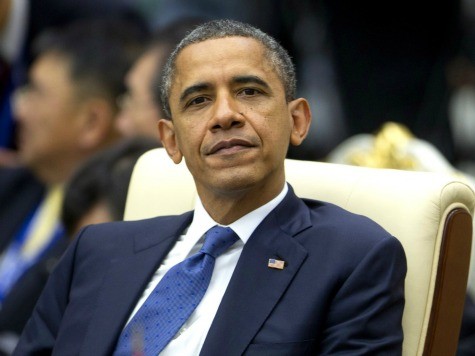
In his weekly radio address Saturday, President Obama rejected any short-term increase in the debt ceiling. The move was a preemptive rejection of a potential House proposal to allow a short-term increase in the debt along with reopening government, which days ago had been a key demand from Obama. The development shows how the balance has shifted in the fiscal stand-off.
It is a stark change from where things stood at the beginning of the week. Polls showed that, while the public gave more blame to Republicans for the shutdown, a large number of voters also blamed Obama and the Democrats. The Republicans were in a much stronger position than in 1995/96 and Obama was in a much weaker position than President Clinton had been. An AP poll found Obama’s approval rating falling to 37%.
Cracks were appearing between the President and Senate Democrats as Obama tried to shift away from his “no negotiations” stance, a position that was increasingly unpopular with the public. By Wednesday, however, it was the Republicans who cracked.
After talks with the White House, the House GOP offered a “clean” six-week extension of the debt limit, to accommodate further talks on the budget. Obama rejected this proposal on Thursday, saying that the plan didn’t reopen the government and made that a condition for any deal. On Friday, the House GOP put forward a murky proposal that would extend the debt ceiling for six weeks and reopen government through mid-December.
The House GOP caucus is meeting Saturday morning to work through the details of that proposal. Obama’s advance rejection of the deal pushes the House, for now, into the background on the fiscal showdown.
Obama’s hand in the talks with the House was strengthened considerably by a competing proposal from Senate Republicans. The outline for their proposal would lift the debt ceiling through January, 2014 and reopen the government for six months. In exchange, the Senate GOP is seeking some tweaks to ObamaCare, such as a repeal of the medical devices tax.
The competing proposals allowed Obama to play the House and Senate GOP off each other, as each caucus sought the lead position on negotiations. He has hosted separate meetings with each caucus, giving just enough encouragement to each to allow them to proceed with talks. His position has been helped as Senate Republicans have criticized the House GOP efforts.
“House Republicans so far, don’t want to get rid of the shutdown,” Sen. Jeff Flake said, speaking about the first House proposal. “I don’t know in what world we’re faring well under the shutdown in terms of policy or politics.”
“Obviously, there was a better strategy than shutting down the government in order to defund Obamacare,” Sen. Lamar Alexander said, “because where we are is Obamcare is chugging along and the government is shut down after two weeks.”
The GOP infighting has allowed Senate Majority Leader Harry Reid to remain out of the public spotlight. Last week, public gaffes by Reid had weakened the Democrats’ position. Reid is preparing a one-year “clean” debt ceiling increase, that would take the debate over the nation’s debt past the midterm elections in 2014. He has scheduled a vote on that measure for Saturday afternoon. If is uncertain how many Republicans will support the measure. Reid needs 60 votes to pass the debt hike.
Talks will continue throughout the weekend, but it is likely some kind of deal will be hammered out before the nation returns from the holiday weekend. The moves Thursday and Friday signal that the GOP wants this entire debate behind it. Obama has seized on that and will end up, likely, with a far more favorable deal than seemed possible one week ago.

COMMENTS
Please let us know if you're having issues with commenting.